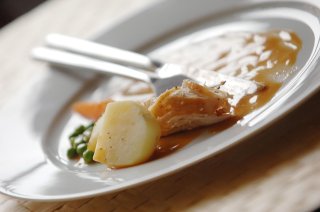 Food waste that is sent to landfill doesn’t break down harmlessly. It has a big impact on the environment as it rots and releases methane – a harmful greenhouse gas that is 25 times more potent than carbon dioxide.
Food waste that is sent to landfill doesn’t break down harmlessly. It has a big impact on the environment as it rots and releases methane – a harmful greenhouse gas that is 25 times more potent than carbon dioxide.
The best thing we can do with our food is to enjoy it. Love Food Hate Waste has lots of recipes, tips and ideas on reducing food waste, saving money and making the most of your food.
However, when food waste is recycled, it can be turned into something useful - like compost or energy!
Which container?
We currently only provide separate food waste collections to a small number of households on our food waste collection trial - you can read more about this below.
If you are not on the food waste collection trial, the best way to dispose of food waste is to compost it. Take a look at our composting page for more information on how to get started.
You could also try trench composting with food waste such as fruit/vegetable scraps to add nutrients to your soil and help retain valuable moisture - all you need is a spade!
If you do not have a composter, you'll need to dispose of food waste in the black bin. Please do not put it in the garden bin.
Weekly food waste collection trial
What is the food waste collection trial?
NWLDC food waste trial transcript (Word Document, 0.1 Mb)
As part of our Recycle more... plan, we're looking at ways to encourage residents to recycle more items, more often. As part of this, we're currently trialling a weekly food waste collection with 4000 households in parts of Measham and its surrounding villages, Coalville, Ravenstone and Whitwick.
To find out which streets are included in the trial, please see the documents below. If your street is on one of the lists but you have not received any food waste containers or information leaflets, please email us or call 01530 454545.
Coalville food waste collection days and street list (PDF Document, 0.95 Mb)
Measham and surrounding villages food waste collection days and street list (PDF Document, 0.15 Mb)
I am on the trial, how do I order more food waste liners?
If you are on the trial and have run out of food waste liners, you can order a new roll online.
What happens to the food waste?
During the trials all food waste – including plate scrapings, bones, meat and tea bags – is collected weekly from homes, in addition to the usual recycling collections.
The food waste is taken to a Biogen processing plant in Warwickshire where it goes through an anaerobic digestion process, turning it into biogas which can be used to generate electricity and heat. It also produces a bio fertiliser for use in farming.
So far on the trial we've recycled over 650 tonnes of food waste - that's a CO2 saving of around 487 tonnes!
When will I be able to recycle food waste in my area?
The Government has announced they will provide funding for councils to provide separate food waste collections to all households from 2025. We are currently planning for district-wide food waste collections.
Love Food Hate Waste
Did you know... Around 7 million tonnes of food waste is thrown away by households in the UK every year, and most of it could have been eaten? Over a year the average family throws away around £700 of food - that's about the same amount as an annual utility bill!
Love Food Hate Waste have a website full of recipes, tips and ideas on reducing food waste and making the most of your food. Take a look!
Related Documents (4)
- Pumpkin rescue cookbook (PDF Document, 2.08 Mb)
- Measham food waste trial - Equality and Human Rights Impact Assessment (PDF Document, 0.13 Mb)
- Coalville food waste trial - Equality and Human Rights Impact Assessment (PDF Document, 0.13 Mb)
- Food waste recycling information - example leaflet (PDF Document, 3.86 Mb)
Related Links (2)
Last updated: Tue 2 July, 2024 @ 11:03